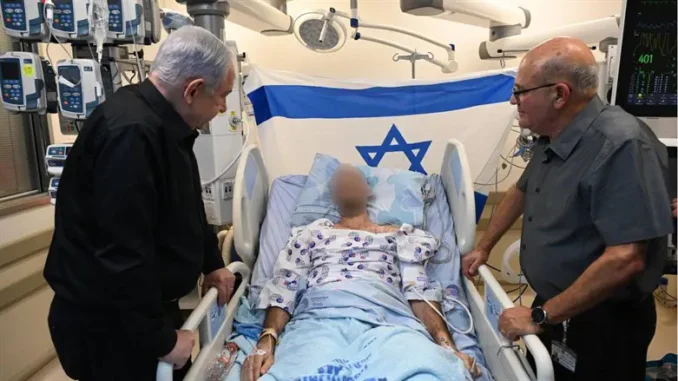How one couple’s trip to comfort wounded IDF soldiers led to an epiphany as to the power of the Jewish spirit.
Rudy and Denise Melnitzer experienced the horrors of October 7th in a way felt by most Jews, and millions of others around the world: they were shaken, revolted, and shocked; they also felt the immediate and visceral need to somehow do something.
A great many Jews around the world sought ways to support our soldiers, displaced families, families of hostages and families of those serving. In the vast majority of cases this support was financial, with organized Jewish groups supplying the direct logistical expertise to deliver the support.
For the Melnitzers, residents of northern California, such support was necessary, but by no means sufficient. They quickly perceived the need for personal outreach, for direct expressions of empathy and comfort. Who better, yet more difficult, to reach out personally to than seriously injured IDF soldiers?
So began a mission that would take the Melnitzers into the presence, and, ultimately, the hearts of dozens and dozens of soldiers and their families.
For the Melnitzers, the soldiers needed to know that they were regarded not just as brave fighters, not just as defenders of the State of Israel, but as the fiduciaries, the “brother’s keepers” of the Jewish People, wherever they might be.
The Melnitzers determined to meet up to 100 soldiers, and to provide each with tangible personal gifts, and the invaluable gift of their appreciation of the soldiers: for what they had done, and what they represented. Ultimately, they met with more than 70 seriously injured soldiers, typically visiting with six soldiers per day.
They coordinated their visit with a young professional, Hadas Dubrawsky, who herself had been a reservist commander and who, as a fluent Hebrew speaker and a fellow soldier, was able to lighten conversations, talk army talk and related well with the soldiers’families.
He had a simple, yet profound opening approach: he wanted to thank the soldiers for defending him in northern California. In other words, he wanted the soldiers to know that he and Denise regarded them not just as guardians for the State of Israel, but protectors of the Jewish People everywhere.
This approach resonated with a large number of the soldiers, who understood that their responsibilities were even greater than they had envisioned them. Whether they fully accepted that mantle onto themselves, Rudy’s message was a great way to break the ice, and to start a dialogue.
There are certainly and understandably those who would wonder whether they had the emotional fortitude to encounter the seriously injured – amputees, those with severely damaged heads and spinal injuries, or the victims of brain as well as physical injuries.
While the Melnitzers never asked a soldier what had happened, the vast majority of the soldiers were eager to talk about their situations, about what had happened to them. There was no self-pity, no self-flagellation, and certainly no blame ascribed to anything but the reality of conflict.
What amazed but did not surprise the Melnitzers was the implicit, unstated ethos of duty, of sacrifice and mission that the soldiers exhibited. Many were eager to return to the fray once they were fitted with prosthetic limbs.
Many talked about their concern for the fellow platoon or tank soldiers, and more than one was comforted that they were able to protect, albeit at a horrific cost, their fellows. The fact that they had put themselves in danger in order to protect their brothers seemed quite natural to them.
It was the quiet courage of wanting to go on, of believing that they would lead normal, happy lives regardless. In this regard, for many of the soldiers there were wives or girlfriends who showed a courage and a resolve that clearly matched that of their beloveds.
The visits averaged about 45 to 50 minutes in length. In a world of two minute videos and eight minute speed dates, these constitute lengthy, even intimate meetings. Meetings of this length are not perfunctory nor obligatory.
Ultimately, the perception that the Melnitzers came with on their mission was more than validated: these soldiers had gladly accepted the mantle of the responsibility placed upon them. They were pleased to hear that their responsibility was even greater than what they had perceived.
These convictions were pronounced by secular and religious soldiers alike. Just as Rudy expressed, these soldiers were protecting not just their fellow soldiers, and not just their families and communities and the State of Israel, but also, and ultimately the Jewish People.
Perhaps that is why the soldiers were so receptive to a visit from Jews from northern California. After all, the soldiers saw themselves defending the Melnitzers and other Diaspora Jews, as well as their own families and Israelis.
Products of the me generation, these soldiers nevertheless saw themselves as standing on the shoulders of proud Jews who themselves had undertaken the defense of their own people. One soldier had pointed to his missing leg and said that it was worth it because it brought Israelis together in unity.
At the end of their marathon of hessed, loving kindness, the Melnitzers understood that they had received far more than they had given. They had been given the epiphany of understanding the quiet unassuming courage that came from the unquestioning and very natural acceptance of a call to service and protection.
The Melnitzers were privileged to receive this epiphany directly from our amazing soldiers. They certainly earned it.
Douglas Altabef is the Chairman of the Board of Im Tirtzu and a Director of the Israel Independence Fund.
Hadas Dubrawsky is a member of the Im Tirtzu team.




Leave a Reply
You must be logged in to post a comment.